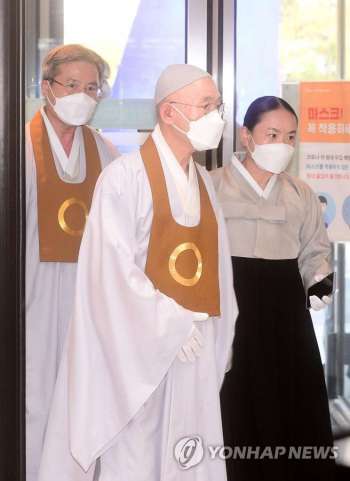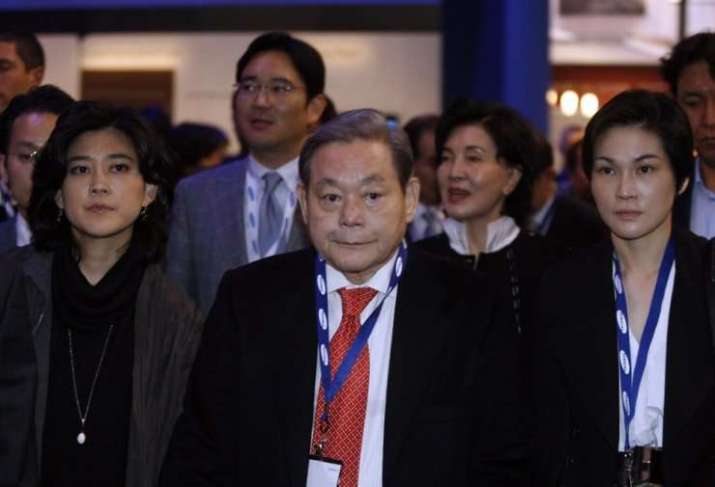Lee Kun-hee, the late chairman of South Korea’s Samsung Group, died on 25 October after an extended illness. He was 78 years old. An encoffining ceremony was held Monday, following the practices of Won Buddhism, of which Lee was reported to have been a follower. A funeral service for Lee is scheduled to be held today, after which his remains are to be laid to rest in the family burial ground in Yongin, Gyeonggi Province.
The ceremony on Monday was attended by Lee’s wife, Hong Ra-hee, his son, Lee Jae-yong, and his daughters, Lee Boo-jin and Lee Seo-hyun. Along with family and friends, business and political leaders paid respect to Lee, who has been described as South Korea’s most influential business tycoon. South Korea’s president, Moon Jae In, offered condolences through his chief of staff and the country’s senior secretary for economic affairs on Sunday. Samsung employees created an online memorial altar to mourn his death.
Samsung described Lee as a “true visionary who transformed Samsung into the world-leading innovator and industrial powerhouse” in a statement confirming his death. “All of us at Samsung will cherish his memory and are grateful for the journey we shared with him.” (CNN)
Lee had spent the last six years in a coma after suffering a heart attack in 2014. Despite his health setbacks, he retained his title at Samsung.
Lee was renowned for his work to turn around Samsung Electronics, which he took over as chairman in 1987. “We are in a very important transition,” Lee said shortly after taking charge. “If we don’t move into more capital- and technology-intensive industries, our very survival may be at stake.” (The New York Times)
His drive to improve product quality and to better understand foreign markets led to Samsung becoming a household name around the globe by the early 2000s. Lee’s career was not without failures, however. In the 1990s, he launched a motor-vehicle division of Samsung, which was later sold off amid poor performance. In 2008, Lee resigned his position as chairman amid criminal tax evasion charges. He was pardoned in 2009 and resumed his role as chairman of Samsung in 2010. His son, Lee Jae-young, has been the public face of the company since 2014.
In 2011, Lee and his wife, Hong Ra-hee, donated some ₩12 billion (US$10.6 million) toward building a Won Buddhist temple in upstate New York. At the time, his wife was described as a follower of Won Buddhism, while Lee was said to have no religious affiliation. Hong’s parents, Hong Jin-ki and Kim Youn-nam, are also described as devout followers of Won Buddhism.
The temple in New York was completed in October 2011, including a large meditation hall, offices, guesthouses, and residential facilities.
 Won Buddhists at the funeral home for Lee's service. From en.yna.co.kr
Won Buddhists at the funeral home for Lee's service. From en.yna.co.krWon Buddhism (원불교; Wonbulgyo) was established in South Korea in 1916 by Pak Chung-bin (1891–1943) as an attempt to revitalize and modernize Buddhism for the contemporary world. The school eschews most Buddhist imagery in a similar manner to Japanese Zen, maintaining the won or circle as a symbol of ultimate truth. Bul means enlightenment and gyo means the teaching of the truth. Like the Humanistic Buddhism found in China and Taiwan, Won Buddhism emphasizes engagement with the world as a central practice.
The central teachings and practices of Won Buddhism include the Threefold Practice: spiritual cultivation, Dharma study, and mindful choice in action; the Fourfold Grace: the grace of Heaven and Earth, the grace of parents, the grace of fellow beings, and the grace of laws; and The Four Great Principles: right enlightenment practice, awareness of the requital of grace, the practical application of the Buddhadharma, and selfless service to the public.

















